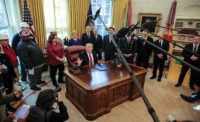President Trump has signed a directive aimed at toughening enforcement of federal Buy American policies for government purchases and for products used on federally funded projects. The executive order, which Trump signed on April 18, also has provisions that seek to counter what administration officials call abuses in the H-1B visa system for skilled workers.
The directive follows up on Trump’s repeated comments that he will put a priority on “Buy American” and “Hire American” policies, including a mention in his Feb. 28 address to Congress.
A senior Trump administration official, speaking on background in a conference call with reporters on April 17, said, “The waivers and exceptions process in Buy American [implementation] have been abused greatly, resulting in many lost job opportunities for American workers.”
The executive order directs agencies to carry out, within 150 days, a review of their Buy American activities, including the use of waivers and exceptions to relevant statutes.
Commerce Secretary Wilbur Ross will review the agencies’ studies and send a final report to Trump within 220 days. A goal is to “maximize the use of domestic content and minimize the granting of waivers,” another senior official said.
Another element of the executive order focuses on trade agreements with other countries under which, the Trump administration contends, the U.S. has effectively waived its Buy American protections. The source added, “It is simply unfair for government contracts to be awarded to low bidders that use dumped or injuriously subsidized foreign-sourced content to push out domestic producers.”
North America's Building Trades Unions praised Trump's action. The group said in a statement: “We are pleased that the president is living up to his campaign pledge to re-affirm the commitment of the federal government to ‘buy American’ when purchasing goods and services, while also limiting the ability of unscrupulous employers to bypass American skilled workers in favor of foreign workers via the H1-B visa program."
AFL-CIO President Richard Trumka said in an April 18 statement, “Today’s executive order is a good first step toward making Buy America provisions more effective and discouraging excessive waivers, but more needs to be done to pivot the U.S. economy toward steady wage and job growth.”
An Association of Equipment Manufacturers spokesman said via email, “The industry is carefully monitoring the implementation of the order, and working with the Trump administration to show how a global supply chain helps to support the industry’s 1.3 million jobs in the United States.”
Thomas Gibson, American Iron and Steel institute president and CEO, also welcomed the executive order, which defines U.S.-made steel as having "all manufacturing processes, from the initial melting stage through the application of coatings" take place in the U.S.
Gibson said, "This ‘melted and poured’ standard has been successfully applied since 1983 and must continue to be the standard used in federal Buy America rules for steel procurement."
But Senate Minority Leader Chuck Schumer (D-N.Y.) told reporters in an April 18 conference call that the Keystone oil pipeline from Canada to the U.S. uses some steel from India, Italy and Canada. Schumer said Trump's pledge to buy U.S. steel is "vapid," adding, "It just doesn't do the job."
In the briefing, a senior official noted that some Buy American policies date to a 1933 law covering federal government purchases. Similar requirements, starting with a 1978 surface transportation law, apply to iron, steel and other products used in federally funded highway transit, aviation and intercity rail projects.
The executive order’s “Hire American” provisions call for the Labor, Justice, Homeland Security and State departments “to take prompt action to crack down on fraud and abuse” in the immigration system, one of the administration officials said.
He added that the directive also aims to ensure that H-1B visas go to the most-skilled or highest-paid applicants, adding that such visas now are awarded through random lotteries, in which 80% of the H-1B visa holders are paid less than the median rate in their fields.
Such visas are for “specialty occupations,” which, according to the U.S. Citizenship and Immigration Services agency, would normally require at least a bachelor’s degree. The occupations include engineering, math, business and technology fields.
Comment from American Iron and Steel Institute added on April 19.



Post a comment to this article
Report Abusive Comment